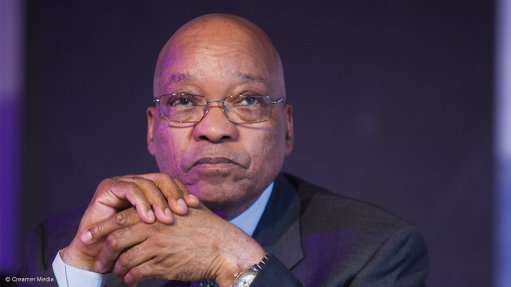
President Jacob Zuma
Photo by: Duane Daws
The level of ambition contained in South Africa’s Intended Nationally Determined Contribution (INDC), which was submitted to the United Nations Framework Convention on Climate Change (UNFCCC) Secretariat well ahead of the twenty-first Conference of the Parties (COP21), is an affirmation of government’s seriousness in dealing with climate change, President Jacob Zuma said this week.
The INDC built on a strong basis of existing national policies and actions, given that, as an African and a developing country, climate change was not a new issue.
“Our society has long been forced to adapt to the reality of a changing climate and increasingly frequent extreme weather events that are the result of emissions of greenhouse gases generated over centuries, predominantly by developed countries,” he said.
Zuma added that the impacts of a changing climate affected nearly every aspect of South Africa’s economic and social development, governance and the delivery of services to citizens – from healthcare to agriculture, to infrastructure and human settlements, to defence and water and sanitation.
“Effectively managing this challenge requires a national response that builds and sustains South Africa's social, economic and environmental resilience, as well as our emergency response capacity,” he noted.
Meanwhile, Zuma pointed out that the Paris Agreement needed to be as ambitious as possible to tackle the environmental challenge, while protecting the development space of developing countries.
He said it was in the country’s interest to have a legal agreement that was fair, would strengthen the multilateral rule of law, would provide predictability and would allow government to respond more effectively to the pressing socioeconomic challenges and acute vulnerability to climate change.
“Climate change is a global problem, requiring a global solution, which can only be effectively addressed multilaterally, under the broad-based legitimacy of the UNFCCC and with all parties contributing their fair share,” he said.
Further, the President pointed out that a fair and ambitious agreement would mark the successful conclusion of a mandate agreed to by consensus at the Durban conference in 2011 to enhance the implementation of the existing convention.
“South Africa has a special interest in doing all it can to ensure the success of the Paris COP and is providing its full support to the incoming French Presidency.
“As the current chair of the Group of 77 and an active member of the Africa Group of Negotiators and the Brazil, South Africa, India and China group, South Africa also has the special responsibility of advancing the collective and shared interests of developing countries in the negotiations for the Paris Agreement,” he highlighted.
This necessitated defending the legal rights of developing countries under the convention, including generating the support required to make the transition to a low-carbon economy and to adapt to the reality, loss and damage of a climate that was already changing.
Zuma asserted that government’s actions needed to be based on equity and differentiation of action and support, given different capacities and national circumstances and the different degrees of responsibility for climate change.
“The provision of financial resources, technology transfer and development and capacity building is central to the Paris Agreement. The reality is that, without adequate, predictable and sustainable means of implementation, it will be impossible to reach our agreed temperature target.
“This is because key mitigation potential is in developing countries, such as South Africa, and these countries are not able to realise this potential on their own,” he added.